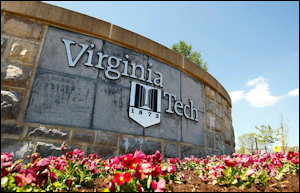In the wake of a U.S. Supreme Court ruling, Virginia Tech has announced that it will eliminate race and legacy status as factors in admissions. Information about an individual’s race/ethnicity will no longer be visible during the application process.
“Much of our recent success in attracting and graduating students from underrepresented minority and underserved backgrounds (including low-income, first generation and veteran students) has been achieved by lowering barriers to admissions, creating effective pre-college programs, and supporting our students while on campus,” said President Tim Sands. “We will increase our emphasis on those programs and support mechanisms going forward.”
These changes strike me as a reasonable compromise in response to the Supreme Court ruling. Dropping race and ethnicity as factors in admissions ends the invidious practice of explicit discrimination on the basis of race. It represents a huge defeat for “anti-racists” who believe that the only antidote to past discrimination against minorities is reverse discrimination in their favor.
Tech has coupled that decision with a formal end to favoring legacies. Given the fact that legacies are disproportionately White, the symbolic value is huge.
“We’ve placed less and less emphasis on legacy in recent years, to the point that it’s not factoring into admissions decisions in any significant way, and yet our legacy numbers have remained really strong,” said Juan Espinoza, associate vice provost for enrollment management in the Virginia Tech statement on its new admissions policies. “While around 12 percent of our applications are legacy, they comprise over 20 percent of the incoming class. This demonstrates that legacy students are applying with all the academic and extracurricular preparation that they need to compete for admission.”
Tech’s strategy is to encourage applications by students from under-represented groups by reducing barriers to admission. One of those obstacles has been the practice of granting early admissions for up to 20% of the seats in an entering class. Early acceptances posed a quandary for students from less affluent families who had to decide whether to lock in their acceptance before knowing how much financial aid they would receive.
“By eliminating early decision, we are simplifying our application process and also leveling the playing field for all students, regardless of their household income,” Espinoza said.
Tech also eliminated a requirement to submit SAT and ACT exam scores, presumably on the grounds that students from poor families are less likely to be able to afford the fees associated with taking the exams or prep courses for the exams.
The shift in admissions policies does not mean Tech has abandoned its commitment to “diversity.” Tech’s statement noted that in 2022 the university achieved a key milestone in its strategic plan, with 40.4% percent of the incoming class composed of “underrepresented minority students and underserved students.”
In a 2022 press release, Tech stated that 8.7% of the 2022 entering class identified as Black, doubling the number compared to the 2017 entering class. Hispanic/LatinX students comprise 10.9% of the 2022 entering class, an increase of 79% compared to 2017. Tech did not provide a breakdown of Asian students, who are over-represented compared to their percentage of Virginia’s population.
Some reservations. Tech’s new admissions policies represent a compromise between the dominant ethic within the university, which is “anti-racist” in the woke sense of the word, and the dominant ethic outside the university, in which a significant majority of Americans reject the idea of racial preferences in university admissions. That compromise leaves some issues unaddressed.
Nowhere in Tech’s announcement does the word “merit” appear. Virginia Tech is one of Virginia’s most prestigious higher-ed institutions, and its College of Engineering enjoys national renown. One would think that Tech would take the opportunity to reaffirm its commitment to academic aptitude and achievement as a basis for admission. To the contrary, Tech made voluntary the submission of SAT and ACT scores, which are highly reliable (though not perfect) predictors of academic success at the college level.
Likewise, while Tech stresses its commitment to “diversity,” it is clear that the university is concerned overwhelmingly with racial/ethnic diversity. In the leftist catechism, the only identities that matter are race/ethnicity, gender and sexual preference. The Tech administration expresses no concern for other dimensions of diversity, such as diversity of viewpoint. Like other leading higher-ed institutions, Tech’s intellectual monoculture suppresses diversity of thought. Eliminating racial preferences in admissions won’t change that.
James A. Bacon is executive director of The Jefferson Council. The views expressed here are his own.


Leave a Reply
You must be logged in to post a comment.